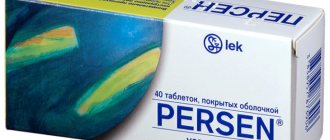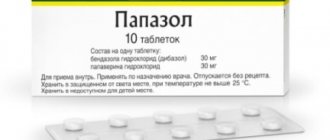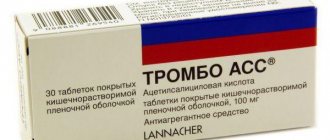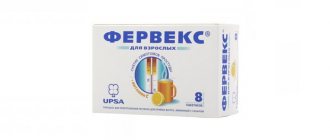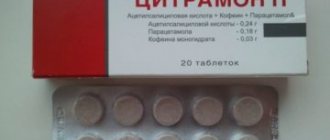Pharmacological action of Cetrin
Cetrin is a histamine antagonist that blocks H1 histamine receptors . The active ingredient is cetirizine. Cetrin is indicated as a prophylactic against allergic reactions, as well as to facilitate their occurrence. It has an antipruritic and antiexudative effect. Affects allergic reactions at an early stage. At the stage of an allergic reaction, the drug limits the release of inflammatory mediators. Cetrin prevents tissue swelling, relieves smooth muscle spasms, and reduces capillary permeability. Eliminates skin reactions to specific allergens. Does not have antiserotonin and anticholinergic effects. Subject to therapeutic doses, it has virtually no sedative effect. After a single dose of the drug, the onset of effect, in approximately half of the patients, is observed after 20 minutes, after 1 hour in 95% of patients. The effect of the drug lasts more than 24 hours. During therapeutic treatment, tolerance to the antihistamine effect of the drug does not develop. After completion of treatment, the effect of the drug lasts up to 3 days.
Cetrin or Claritin
Both medications are modern antihistamines that can replace each other, but they differ in composition.
The active component of Claritin is loratadine, which is well tolerated and demonstrates pronounced antiallergic properties.
When selecting a suitable medicine, it is worth taking into account the individual characteristics of the body, the presence of concomitant diseases, and the tolerance of a particular active substance.
Particular care is required in the treatment of patients with severe liver dysfunction. Experts consider Claritin to be one of the safest antihistamines.
Claritin in the form of syrup, like Cetrin, is recommended for use by children from 2 years of age. Both drugs exhibit a therapeutic effect within 20 minutes and maintain a therapeutic effect for a day.
Claritin is a Belgian drug that acts gently, without causing addiction or drug dependence, even with long-term use. Tablets are available in 7 and 10 pieces per package, but their cost is higher than that of Cetrin.
Claritin is used in multicomponent treatment regimens; the drug helps to cope with runny nose of allergic origin, various types of dermatitis, eczema, bronchial asthma, and insect bites.
The total duration of treatment is 14 days. Depending on the indications and tolerability of the medication, the course may be extended.
Cetrin dosage and instructions for use
Cetrin is taken orally, washed down with water in tablet form, and dissolved in water in the form of drops.
Dosage for children over 6 years of age and adults – 10 mg of the drug once a day, or 5 mg twice a day. Children from 2 to 6 years old, half the adult dose. Children from one to two years old, 2.5 mg (5 drops) 2 times a day. For patients with reduced renal function, 5 mg once daily. For severe forms of chronic renal failure, Cetrin is indicated at a dose of 5 mg once every 48 hours.
Contraindications
Contraindications for use for both Cetrin tablets and Cetrin syrup are the same. The drug should not be taken if:
hypersensitivity or allergy to its components; pregnancy and breastfeeding; under 2 years of age if we are talking about syrup, and under 6 years of age if we are talking about tablets.
Old age and renal failure can be considered as relative contraindications. In these cases, the standard adult dose is reduced, and the patient's condition is monitored by a doctor.
Release form
The manufacturer of Cetrina is the Indian pharmaceutical company DR.
REDDY`S LABORATORIES, LTD. The drug is available in tablet and syrup form. The latter is commonly called “children’s Cetrin” because it is most often given to children. Or “Cetrin drops,” which, of course, is wrong. Citrine syrup is produced in glass bottles of 30 ml or 60 ml. Each dark glass bottle is supplemented with a measuring spoon. The syrup is transparent. Usually it is not colored by anything, but sometimes it has a slight yellowish tint. The syrup is homogeneous. It contains no suspended particles, although slight opalescence is possible. Has a pleasant fruity smell.
https://www.youtube.com/watch?v=ytdevru
Cetrin tablets are produced in packages of 10, 20 and 30 pieces. The shape of the tablet is biconvex and round, with a mark on one side. The top of the tablet is covered with a white film coating.
Indications for use
The medicine "Cetrin" is intended for the relief and prevention of various allergic reactions, for example:
- With the inflammatory process of the nasal mucosa, which is caused by flowering plants.
- Against the background of urticaria, including idiopathic.
- With angioedema.
- Due to an allergy to ultraviolet radiation.
- For hay fever.
- Against the background of allergic conjunctivitis.
- For bronchial asthma.
- When skin itching occurs.
- Against the background of increased lacrimation.
- Against the background of allergic reactions caused by bites of mosquitoes, bees and various insects.
In addition, this drug is prescribed to patients during periods of taking other medications or food products that cause unwanted allergic manifestations.
Information about side effects contained in the instructions
"Cetrin" can cause fatigue, sleep disturbances, headaches, and agitation. As a result of taking the medication, nervousness, anxiety, euphoria, dizziness, and amnesia develop. Some patients experience depression, depersonalization, paralysis, thinking disorder, and impaired concentration. As the instructions indicate, “Cetrin” provokes undesirable consequences from the digestive system. In particular, as a result of therapy, dyspepsia, stomatitis, anorexia occur, and taste perception changes. Side effects include abdominal pain, gastritis, vomiting, thirst, and swelling of the tongue. In some cases, liver activity may be disrupted, diarrhea, flatulence, rectal bleeding, and hemorrhoids may occur. The drug has a negative effect on the organs of vision. When taken, conjunctivitis, glaucoma, and soreness in the eyes may develop. Rarely, the use of the drug causes heart failure, hypertension, and palpitations. Cases of nosebleeds, rhinitis, and pharyngitis have been reported in practice. Some patients experienced increased bronchial secretion. Among the undesirable consequences, experts point to the likelihood of developing infections in the upper respiratory tract, pneumonia, and hyperventilation. The medication may cause urinary retention, polyuria, swelling, cystitis, dysmenorrhea, vaginitis, menorrhagia, and intermenstrual bleeding. In a number of cases, a weakening of libido was observed when taking the drug (this is indicated by the instructions). "Cetrin" causes back pain, myalgia, arthritis, and muscle weakness. As a result of therapy, blistering rashes may occur and sweating may increase. With hypersensitivity, the likelihood of angioedema is high. Undesirable consequences include seborrhea, photosensitivity, erythema, hyperkeratosis. Other frequently occurring side effects include changes (in particular, increase) in weight, diabetes mellitus, fever, general malaise, hot flashes, breast tenderness, and dehydration. As a result of treatment, tinnitus, disturbance of smell, deafness, and emotional lability may appear. If negative consequences occur while taking the drug, you should consult a doctor. Depending on the severity of the condition, Cetrin may need to be replaced. Only a doctor prescribes an analogue of the medicine. A specialist may, in particular, recommend a medication such as Zyrtec.
Erius or Cetrin
Erius is an analogue of Cetrin only in the pharmacological group. The drugs differ in composition; the active component of Erius is desloratadine.
This is a third generation substance: non-toxic, effective, non-addictive and non-addictive. Does not provoke drowsiness, does not affect the speed of psychomotor reaction.
However, the cost of Erius is several times higher than the price of Cetrin.
In pediatrics, preference is given to modern and high-quality drugs, including 3rd generation antihistamines, of which Erius is a representative.
The syrup is allowed for children from 1 year of age: young patients tolerate the drug well, the therapeutic effect develops half an hour after using the medicine.
In rare cases, Erius can provoke undesirable reactions such as increased fatigue, headache, tachycardia, palpitations, and dry mouth.
In isolated cases, young children had a rise in body temperature, bowel movements, and insomnia. According to studies, exceeding the dose by more than 4 times did not cause any adverse reactions.
Unlike Cetrin, Erius does not interact with drugs that include ketoconazole, azithromycin, erythromycin, fluoxetine, cimetidine. This expands the use of Ericsa in people with underlying health conditions.
Analogs
The domestic pharmaceutical market offers Cetrin analogues, as well as synonymous drugs. The first include all antihistamines (histamine blockers). The second includes all products whose active component is cetirizine.
Cetirinax; Cetirizine; Cetirizine-OBL; Cetirizine DS; Cetirizine-Teva; Alerza; Levocetirizine-Teva; Allertek. Zyrtec; Parlazin. Cetirizine Hexal; Zodak. Zetrinal; Zintset.
Letizen solution and tablets.
Alerpriv; Allerfex; Bexit-sanovel; Glenceth; Histaphen; Hyphastus; Diacin; Dimerbon; Dimedroquine; Dinox; Dramamine; Deslortadin-Teva; Clallergin; Clarifer; Ketotifen-Ros; LauraHexal; Loratadine Stada; Loratadine-Verte; Loratadine-Teva; Loratodine-OBL; Lordestin; Rupafin; Ciel; Telfast; Caeser; Fexadine; Fexo; Fexofast; Fexofenadine. Claritin; Xizal. Clargothyl; Claridol; Clarisens; Clarotadine; Kestin; Ketotifen; Ketotifen Sopharma; Loratodine; Loratodine-Hemofram; Peritol; Suprastinex; Erius; Erolyn. Semprex; Rapido.
Lomilan lozenges and suspension.
Dragees and Diazolin tablets.
People generally respond positively to Cetrine, since it eliminates allergy symptoms for a long time and quickly. Many people switch to it after the more expensive Zodak and Parlazin, since the drug is not inferior to them in effectiveness. Cetrin also perfectly relieves severe swelling and itching of the skin caused by reasons not related to allergies.
A small percentage of people leave negative reviews about the drug, citing the fact that it did not help them specifically. However, they express themselves neutrally, understanding that each organism is individual.
Cetrin tablets instructions for pregnancy, analogues for children
annotation
Cetrin (Latin name "Cetrine") is a medicinal antihistamine. Antiallergic, antipruritic, stops muscle spasms.
The principle of action is this: if the body is irritated by something, it releases the hormone histamine. Sometimes he confuses ordinary things (for example, dust) with bacteria and gets an allergy. And this remedy acts as a blocker.
Pharmacologically called an H1-histamine blocker.
These tablets are included in the group of vital drugs. Description, information on use and dosage are in the insert. (material provided by Wikipedia)
What are the tablets for, indications for use?
Indications for use: allergic reactions that manifest themselves as rhinitis, dermatitis, urticaria, swelling and dermatitis. Prescribed for colds, for symptoms of chickenpox, when you need to take antibiotics (for sore throat, urticaria, joint diseases), allergic conjunctivitis.
- It should also be prescribed when replacing the lens (for intraocular lenses), so that allergies do not occur.
- Helps with allergies to animal fur. For example, cats. Effective for all types of allergies.
- It can also be included in the treatment of asthma.
- Cetrin ointment is used for eczema.
Ingredients, how much does it cost?
Release forms: coated tablets, syrup. This is a 2nd generation antihistamine.
The tablet contains 10 mg of cetrizine dehydrochloride (the active ingredient is a metabolite of hydroxyzine) and additionally: lactose, povidone, magnesium stearate and corn starch. The shell also consists of excipients: talc, hypromellose, ascorbic acid, polysorbate and demitecon.
The syrup contains components such as sugar and water.
Available in a cardboard box. Quantity - 20 tablets. in a film shell.
Manufacturer India. Shelf life: 2 years. The average cost of tsetrin is 170 rubles. The Russian analogue is cetirizine.
Cetrin analogues are cheaper
Which manufacturer you won’t find on the market. An analogue of cetrin can be found in any pharmacies. The most common allergy medications: suprastin, loratadine, claritin, zodak, zyrtek (drops), tavegil, erius, diazolin, fenkarol, kestin. All of these medications are antihistamines, but the active ingredient is not the same for everyone. And there is also a generational difference between these medications. A more detailed and complete list by generation can be found on the Internet. These tablets like to be coated with film.
The cheapest analogs include Zodak, Letizen and cetirizine (Russian). Their prices are up to 100 rubles. The doctor should decide what to replace the medicine with.
Suprastin or Cetrin, which is better to take?
Doctors recommend cetrin for home use, as it is not so strong. While Suprastin is an old, proven drug, it belongs to the first generation and is used more if the patient is in the hospital. It blocks all receptors indiscriminately and it is unknown what the reaction will be, be it an adult or a child. This way you can observe the patient's reaction.
On average, the effect of the drug will begin no less than an hour after administration. But it is worth considering each organism separately. One thing will help some, and another will help others.
Which is better Cetrin or Zodak?
The active ingredients of the drugs are the same. But the difference is in the form of release. Zodak comes in drops. And many people say that it is more effective and faster. Zodak made in Czech Republic. But when taking it, you need to take into account your age and the body’s reaction to a particular drug.
Instructions for use of Cetrin for adults
When using the drug, consult your doctor.
Adults need to take one tablet per day with a glass of water. Drink before or during meals. Or you can divide the dosage in half and drink half twice a day. For severe allergies, treatment requires hospitalization.
During pregnancy
Taking tablets during pregnancy and breastfeeding (lactation period) is contraindicated.
Children dosage
- Give to children from 6 years old. The dose is the same as for an adult. 10 mg once a day.
- Syrup can be given from 2 years of age, but only as prescribed by a doctor. Give 5 ml in the evening.
How long can I take it?
- If you need to relieve an acute allergic reaction, then the course of treatment is 10-14 days.
- For the treatment of dermatitis, it is taken without interruption for one to one and a half months.
From what age?
Taken in tablet form from 6 years of age. How about syrup with 2x. The syrup has a shelf life of one year.
Reviews from doctors
Cetrin belongs to the second generation drugs. This means that it selectively acts on receptors in the nervous system and does not injure it as much. Therefore, doctors can often recommend and indicate cetrin, and also prescribe it to both children and adults for home use. It is also convenient that you only need to take it once a day. In the reviews there are many photos of what this drug looks like. And the same clearly shows what effects it gives.
There is an advertisement about this medicine - a song. And also citrine is a stone. Therefore, do not confuse this when searching. Many people also say: “Cetrin is with me all year round.”
Contraindications, overdose
Alcohol and antibiotics are not compatible with cetrin. They inhibit the functioning of the nervous system. Also a contraindication is intolerance to the components and should not be used by pregnant women.
Overdose may cause drowsiness, nausea, dry mouth, constipation and panic. An overdose is considered to be 50 mg.
Side effects
Unfortunately, there is often a side effect. These are drowsiness, swelling, allergic reactions, gastrointestinal upset and headaches.
promedicine.ru
special instructions
Due to the possible occurrence of seizures, people who suffer from epilepsy should take Cetrin with great caution. The instructions recommend that adults refrain from drinking alcoholic beverages during treatment with this drug.
People who have spinal cord injury as well as prostatic hyperplasia should use this drug with great caution due to the risk of urinary retention. This medicine may also cause drowsiness. This must be taken into account when driving a car or when working with dangerous machinery.
The instructions for use of Cetrina warn about this. Reviews and analogues of this drug are also of interest to many, as will be discussed below.

